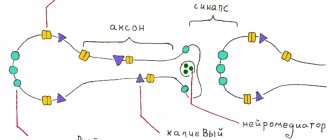Many women who had been married for a long time said that the stress of hearing about the death of their husband had a more depressing effect on them than the death of other relatives. Given the fact that the connection between spouses is broken on a very personal and deeply intimate level, the most profound shock occurs in the first 6-12 weeks. It is during this period of grief that an understanding of the external factors and events that led to death occurs, an understanding of one’s internal processes and a transformation of thoughts aimed at acceptance.
Accepting the loss of a loved one is a behavior that is learned throughout life and which cannot be learned... Each case of experiencing this loss is unique in itself through the acceptance of its own logic of self-preservation, through its own point of overcoming grief.
Let the advice of women who have gone through this test help you accept yourself and find new meaning in your life:
1) Remember that here and now you are needed alive and by those who love you.
2) Remember, no organism works for self-destruction and no matter how hard it is, bright days are ahead. This is another stage of life experience and adaptation, you need to go through it and soon you will have a new meaning in life, a new goal, but for now:
- think about the living and continue to care for someone;
- Avoid seclusion.
3) Know that any reaction that manifests itself through feelings and emotions is an acceptable response to a stressful situation. Only through the lens of personal experience can you go through this path; do not hold back your emotions: if you want to cry, give free rein to your tears; if you feel a desire to remain silent, do not ignore it.
4) Know that over time you will learn to distinguish between heavy grief and light sadness.
5) Develop a sense of gratitude for what happened. This is a balm for the soul!
6) At first, if possible, do not stay alone at home. Consider all possible options:
- walk outdoors;
- go to people, visit someone.
7) Share your experiences with friends and family, this will help reduce your emotional background, release your body, and reduce the moment of isolation and loneliness.
 Remember, asking for help and accepting it is normal practice! We turn to the bank for a loan, to the doctor for health, to friends for advice. If your heart is heavy, contact a psychologist, take advantage of his knowledge and experience and you will receive the necessary support and help.
Remember, asking for help and accepting it is normal practice! We turn to the bank for a loan, to the doctor for health, to friends for advice. If your heart is heavy, contact a psychologist, take advantage of his knowledge and experience and you will receive the necessary support and help.
9) Understand that grateful memory should not be confused with obsessive memories of tragedy. After several months, it is worth removing things that remind you of the deceased, bring you back to the past, or cause additional pain. Many people practice charity in this case:
- distribute the deceased's belongings;
- continue the work of the deceased.
10) Know that even a partial return to your responsibilities, providing all possible help to others reduces self-alienation and helps you find support, your significance and need.
11) Remember that people who are motivated to achieve their goals cope more easily with difficulties and stress. Set yourself small goals and reward yourself for achieving them.
12) Allow yourself to do things that you didn’t have time for before, this will help you capture the feeling of the moment - “I’m living!” Do what pleases you and gives you pleasure. Perhaps this will be related to health, the implementation of creative projects, home improvement, or something else that is important specifically for you...
13) Catch notes of joyful sensations and let them be fleeting... This will be the beginning of the integration process, the desire to accept the present and strengthen in it.
14) Take an active position to overcome yourself. This will help:
- resourcing through awareness of one’s mortality and the meaning of life;
- goal setting, seeking outside help and working to achieve results;
- organizing control over what is happening;
- the opportunity to look at yourself from the perspective of personal achievements and raising self-esteem;
- physical activity - sport helps produce neurotransmitters - dopamine (the hormone of happiness and pleasure).
Life story and commentary from a psychologist
Irina is 55, and she recently lost her husband, with whom she lived for almost 30 years. The husband died as a result of illness. Irina blames herself for the tragic event and believes that she could have prevented the disaster if she had paid more attention to her husband’s health. The woman has no children. Irina’s only friend lives far away and does not have the opportunity to meet with her often. Only her beloved dog saves the widow from her dark thoughts. Irina has lost the meaning of life and is afraid of going crazy.
According to the psychologist, the loss of a loved one is an event that cannot be overcome without pain, and one must come to terms with it. It is necessary to experience all stages of grief.
After a state of shock, a person is faced with a feeling of guilt. However, everyone should remember that it is impossible to predict everything. And remorse further aggravates the state of sadness in which the widow finds herself. Those facing the pain of loss need to be patient and work through all the stages of grief and feelings associated with the sad event.
And if there is no grief, is that normal?
Australian scholar and director of the Grief Center Christopher Hall writes that everyone experiences loss differently. It is possible that you will not grieve the way it is shown in the movies or the way your relatives come to life. You may be coping with your mom's death without tears, but it can still be grief.
If the mother was ill for a long time, the child could grieve her loss even before death. Because the loss is not only death, but also the loss of hope, the loss of a close relationship with the mother.
Sometimes it happens that mother and child do not have a close relationship. Then, even though the mother is a related person by blood, perhaps her child may not experience grief from the death of the mother.
Olga Shaveko
After the death of your mother, you can feel relief if the relationship was bad. Then you can feel that conflicts and resentments have stopped. It is difficult to accept the feeling of relief and joy due to guilt. After all, my mother died, and in such a situation it is customary to grieve. But any emotions are normal, you can allow yourself to feel them.
There may also be relief if the mother was sick for a long time and it was difficult to care for her. When a person is tired and burned out during caregiving, they may feel relieved that the hard work is over. And this is also a normal feeling.
Priest's recommendations
The Orthodox Church perceives death as an integral part of human existence, his transition from earthly life to another world. A widow who cannot come to terms with her husband’s departure for a long time is not ready to give the soul of her chosen one into the hands of the Lord.
For a person to find peace in another world, he needs the prayers of his family. When turning to God, a woman should concentrate in her words all the love and tenderness that she feels for her departed spouse. You should pray for the soul of the deceased for 40 days.
The widow should remember that the Lord does not give a person more trials than he can bear. If a woman is faced with such a sad event, God will help her cope with grief.
According to the priest’s advice, confession helps overcome mental pain.
You can light a candle in the temple for the repose of your spouse’s soul.
If grief befalls a woman who has children, she needs to show willpower and start living again for their sake. According to the priests, mourning for a spouse should be carried out from one to three years. After this, the widow is advised to remarry.
How to say goodbye to your mother?
All cultures have rituals of farewell to the deceased. They may differ, but they have a similar meaning - they help to acknowledge the fact of loss, say goodbye, and be together in difficult times. According to clinical psychologist Kristi Denkla, one of the steps to coming to terms with the fact of death is to see the body of the deceased. Therefore, many psychotherapists advise attending the funeral.
In Russia, it is customary to say goodbye at a funeral and then at a wake. Also, many remember the deceased on his birthday and the day of death.
If you didn't have the opportunity to attend the funeral, you can say goodbye in a different way. For example, write a farewell letter and burn it, play your favorite song with your mother at a family meeting, go on a trip to her favorite places. All these actions are symbolic, but they also help to overcome grief.
Olga Shaveko
Rituals help you say goodbye. There are situations when it hurts so much that you can’t talk about your mother or remember her. Then the topic becomes taboo. Funerals and wakes are needed to get everyone together and say goodbye. This is a kind of transition to reality, where the person is no longer with you.
Mother's birthdays and death days remind us that now is the time to remember and talk about her. Conversations are needed to share sadness with other people, to recognize that there was a person, everyone remembers him, but now he is gone. These are the traditions that are worth preserving because they help you adapt to loss.
Even if people do not perform special rituals, they still tend to remember the dead on their important dates. Often clients come to therapy on the anniversaries of the death of their loved ones.
Advice from psychologists and women who have experienced loss
Any experienced specialist knows that getting “stuck” in one of the stages of grief has a negative impact on the emotional state. And leads to the development of pathologies. To overcome all stages of grief and accept loss, psychologists give the following recommendations:
The money tree pleases with lush flowering: my secret is in caring for the leaves
"Dad is offended." Agata Muceniece about her relationship with Priluchny after the divorce
A student at the Vietnam Police Academy shared how she takes care of her facial skin.
- Don't be afraid to seek support. Communication with friends and family allows you not to withdraw into yourself and gives an outlet for negative emotions. Therefore, you should not reject loved ones who strive to lend a helping hand during a difficult period.
- You can change the situation. If circumstances permit, the widow should live with relatives or a close friend for about a month. These people will help a woman quickly cope with her loss and overcome everyday difficulties.
- Taking care of a pet is a good “cure” for stress. A widow can give a dog or cat her tenderness and warmth. A pet will help her cope with grief faster.
- Experts advise getting rid of your deceased spouse's belongings. It is better to burn the clothes, throw them away, or give them to those in need. Photos and gifts should be put away so that they do not remind of the tragedy. Once the period of acute grief has passed, these items can be returned to their original place.
- Experts recommend writing a letter to your deceased spouse. And express in it all the accumulated feelings and words that the widow never had time to say to her chosen one. The text can be read in some favorite or memorable place for the couple.
- Psychologists recommend getting rid of guilt. A woman should not torment herself with remorse over events that she thinks could have been prevented. After all, what happened cannot be returned.
- If the death of the husband was due to someone else’s fault, it is necessary to forgive the offenders. This will allow the widow to get rid of bitterness and the burden of circumstances over which she could not influence.
Women who have faced the loss of a loved one know how to survive the death of a spouse. Widows often communicate on the Internet and provide each other with support. Many women say that in difficult times it is necessary to distract themselves from grief, despite the fact that this is very difficult. Hobbies, sports, charity, getting a new profession (cooking courses, hairdressing) can come to the rescue. Travel is another way to cope with loss. It is not necessary to go abroad. You can go on a hiking trip, to another city, or to visit relatives in the village.
Rare shot: Viktoria Isakova showed her grown-up daughter from Yuri Moroz (new photo)
Smooth and fresh skin: dermaplaning, or why a woman needs to shave her face
Why French children behave well: eight ways to raise them
Tips for your immediate environment
A double burden falls on those closest to you - to cope with the strength of your emotions and at the same time find an opportunity to provide support to your mother, friend, relative, neighbor... The main advice in such a situation is to do no harm!
Use the general advice of a psychologist for such a situation.
Remember that presence is also a help! However, respect the boundaries of contact, do not impose your beliefs and preferences:
- At first, do not leave the widow alone for a long time, keep her in sight;
- if her emotions are not blocked, allow any reaction to flow as long as it does not harm her life.
Take on the bulk of the funeral arrangements and encourage the widow to get involved in current issues, thereby helping her to partially disengage and become aware of herself in the here and now.
1) At the first stage, the stage of shock, when the psyche includes protective functions, it is more than enough to establish tactile contact with the widow: hug, stroke... Words during this period, for the most part, tend to cause distrust and alienation, refusal to communicate.
2) At the second stage, psychological support helps to include resources for the future, find a new meaning in life or switch to other values (children, grandchildren, being in demand...)
3) At the third stage, you can begin to work through the remaining traumatic experiences, using a variety of possibilities, after consulting with a psychologist:
- situational techniques;
- visualization techniques;
- suggestive techniques;
- methods of self-regulation;
- relaxation techniques;
- art therapy.
4) In the last phase of grief, I can recommend working with relatives to create a personal memorial page about the deceased and thus preserving the fond memory of him. There you can talk about important events in his life, publish photographs and memorable videos, leave epitaphs or edit a video.
“Everything will pass” - just a formula of consolation? Why doesn't time always heal?
Experts say that the process of mental recovery after tragic events is provided for by nature itself. But its speed depends on the individual characteristics of the person and the circumstances in which she finds herself.
If a person, remembering a sad event, understands why it happened, how to prevent such a situation or cope with it, if he treats this incident as part of his personal history, then the trauma has already been lived. When an individual perceives past negative circumstances as painfully as present ones, the help of a specialist is needed.
Various psychotherapy methods can help overcome grief. However, the support of loved ones will definitely not be superfluous in such circumstances.
We must provide help sincerely, not content with formal phrases that everything will pass, and time heals mental pain.
Found a violation? Report content
What to do if everything around reminds you of your mother?
It happens that it is difficult to come across constant reminders of your mother. And if you lived together, her things would be everywhere: a toothbrush in the bathroom, laundry in the laundry, a mug in the kitchen. But throwing things away or putting them away can be even more difficult than looking at them.
If mom's room remains untouched for many years after her death, it may maintain the illusion that nothing happened. This is bad because a person can remain in denial that his mother died.
Olga Shaveko
Co-founders of the grief portal What's your grief? They advise you to sort things out like this:
Call friends or family members for help. Ask them to collect and throw away things that are definitely not valuable (uneaten food, personal hygiene items, laundry). You can also ask them to help you collect and sort the rest of your things. For example, you can put things in different boxes:
- save for yourself;
- leave for others;
- sell;
- donate, give;
- throw away;
- things that you can't decide yet.
When sorting, it can be difficult to decide what to do with things. It is important to take breaks; there is no need to sort everything out at once.
You can ask yourself questions:
- Do I have room for this item?
- Do I need to save all items? For example, if your mother collected porcelain figurines, the collection may take up a lot of space. Then you can keep a few figures for yourself and give the rest to relatives and friends.
- Can I take a photo of this item? Sometimes it is difficult to part with an item, even if it is necessary. In this case, you can take high-quality photos of the item and keep them as a souvenir.
- Can I make something valuable out of these things? For example, you can make a bedspread from prints of old T-shirts.
Important things for you, photographs, letters can be put in a special “memory box”. Find a suitable storage space and schedule times when you remember Mom and look through the items in the box, such as on death anniversaries and birthdays.
After a loss, especially in the first weeks, it can be difficult to return to activities that involve mom. For example, going to your cafe, mom’s favorite dish, cycling along your route. It is important to gradually regain the opportunity to visit your favorite places and do your favorite things in a new reality where there is no mother.
Here's a way to gradually confront situations that trigger memories:
- Make a list of places and activities that remind you of your mother. Rank the situations from the simplest to the most complex, causing a lot of feelings.
- Make a plan for how and when you will begin to face the situations you have been avoiding. To make it easier, ask a friend or close family member to go with you.
- Be gentle with yourself, it's best to start with small steps because it may be difficult to face the reminders again.
- If you notice difficult emotions arising, try to slow down and describe these emotions, feel where exactly in the body they are felt most strongly. This will help you get in touch with your emotions.
When should you seek help?
In an article for the non-profit organization HelpGuide, they name signs when you need to seek help:
- You feel that life is not worth living.
- I would like to die with my mother.
- Blame yourself for your mother's death.
- For several weeks now you have not felt connected to others, as if you were separated from them.
- You don't trust anyone after your mother's death.
- You cannot carry out your daily activities.
You can also ask for help, even if you are coping: just to make yourself easier and more comfortable.
Olga Shaveko
The loss of a loved one in itself is a reason to seek help. A psychologist or psychotherapist creates a safe space for emotions to live.
I would definitely advise starting work in the following cases: 1. If mom left a long time ago, and the amplitude of emotions does not decrease. 2. If when talking about mom, tears appear, breathing becomes difficult, and it’s difficult to speak. 3. If the grieving process is not so long, but it takes you out of life completely, you cannot work or do household chores.
You can find a specialist on websites and social networks in communities of psychologists: the Gestalt approach, the cognitive approach, systemic family therapy are suitable.
If you don’t have the money for an expensive specialist, you can turn to master’s students. These are people at the last stage of education, they also go to personal therapy and supervision and can provide qualified assistance.











